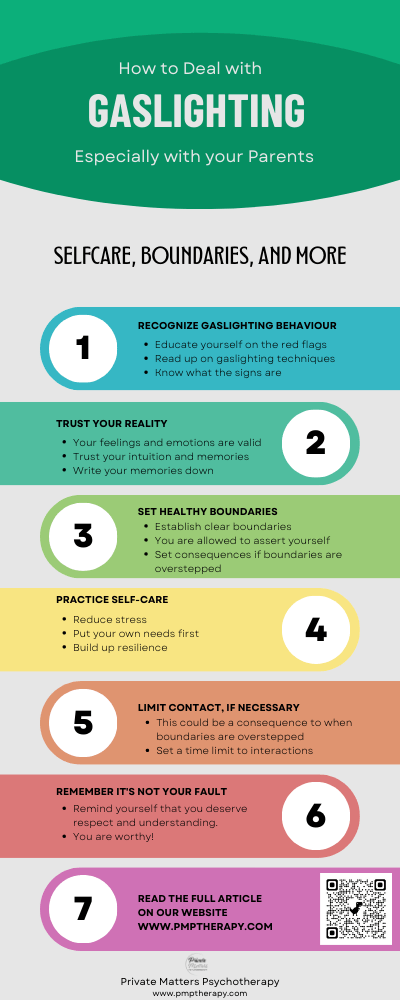Gaslighting in Parent-Adult Child Relationships
Gaslighting does not only happen in romantic relationships or at work. It is a manipulative technique that usually does not “just happen”, but has been present since the start of that relationship. As an adult, dealing with narcissistic and abusive parents has become part of a behavioural routine, and therefore gaslighting parents can be difficult to recognize. In this blog, we’ll be exploring what gaslighting is, examples of gaslighting, and ways to deal gaslighting parents.
The term “gaslighting” refers to a form of psychological manipulation in which one person seeks to undermine the reality, perceptions, mindset and beliefs of another person. Gaslighting tactics are employed to make the victim doubt their own memory, judgment, and sanity. The gaslighter may use various tactics, such as denial, misdirection, contradiction, and invalidation, to distort the victim’s perception of reality and gain control over their thoughts and emotions. Not all those who gaslight do this with intention. Sometimes people are not aware of how their verbal communication can be perceived.
The term “gaslighting” refers to a form of psychological manipulation in which one person seeks to undermine the reality, perceptions, mindset and beliefs of another person.
What is Gaslighting?
The term originated from the 1944 movie “Gaslight,” in which a husband manipulates his wife by dimming the gas lights in their home, then denies that the lights changed when she questions him, making her doubt her sanity.
Gaslighting can be difficult to recognize at first, and is generally intentional by nature. It involves a conscious effort to manipulate and undermine another person’s perception of reality. Gaslighters use various tactics to distort the victim’s experiences, emotions, and beliefs to gain control over them. They often employ these techniques to achieve personal goals, maintain power and dominance, or avoid taking responsibility for their actions.
Having a different opinion of an event is not the same as gaslighting. The main differences being the a gaslighter will often blame the other person for “being too sensitive” or “too emotional”. The conversation if often one-sided, with one person feeling “down” or “broken”. In a conversation about different opinions, both parties respectfully listen to each other and contribute to the conversation.
However, it’s essential to note that some individuals may gaslight others without being fully aware of their actions or the extent of their impact. In these cases, the gaslighting behaviour might stem from unhealthy coping mechanisms, lack of emotional awareness, or unresolved personal issues.
Signs of Gaslighting
There are many signs of gaslighting in a conversation. Recognizing the signs, or red flags, can help to set up positive boundaries and assert oneself. Remember that we cannot change other people, what we can do is practice self care and put our own needs first.
Parents who gaslight will often deny certain events have happened, or try to control their children even in adulthood. In many cases, abusive or narcissistic parents will use gaslighting to control their children. Here are five common signs of gaslighting in parent-adult child relationships:
- Invalidating Feelings: Gaslighting parents may dismiss or belittle their your emotions, making you feel like your feelings are unimportant or irrational. For example, if you were to express sadness or fear, the parent might respond with, “Stop being so sensitive” or “There’s nothing to be afraid of”. Another term often hear is “You are being so dramatic” or blatantly ignoring feelings.
- Denying Experiences: Manipulative parents may deny or downplay your childhood experiences, causing the you to doubt your own reality and memory. For instance, if you were to recall a past event, the parent might insist that it never happened or that you are making it up.
- Shifting Blame onto You: Gaslighting parents may shift blame onto the adult child, making them feel responsible for the parent’s actions or emotions. They might say, “You made me do this” or “If you behaved better, I wouldn’t have to treat you this way.”
- Downplaying your Success: Undermining your confidence and self-esteem, causing you to doubt your abilities and worth. They might use phrases like, “You’re not as smart as your siblings” or “You can’t do anything right”. Another example would be to not acknowledge achievements related to work or school.
- Claiming to Know That They Know Best: Some parents will never acknowledge that their do not know the answer, and that it is always best to listen to them, even if this is to the detriment of the adult child. This type of behaviour often results in an adult who is incapable of making up their own mind or having an opinion of their own.
How to Deal with Gaslighting Parents
Dealing with gaslighting parents can be challenging, and it’s essential to prioritize your well-being and establish healthy boundaries. Here are some strategies to cope with gaslighting parents:


- Recognize Gaslighting Behaviour: Without awareness there is not change to be made. Educating yourself on what gaslighting is, what the different gaslighting techniques are, and how to spot red flags in conversations and relationships are important steps in learning how to respond productively.
- Trust Your Reality: Remind yourself that your feelings and experiences are valid. Trust your intuition and memories, even if your parents try to make you doubt them. Write your memories down, that way, if you do start doubting yourself, you have your own story to fall back on.
- Set Healthy Boundaries: One of the most difficult things to do, but also one of the more effective techniques. Establish clear boundaries with your parents regarding communication and behaviour. Be assertive in communicating what is acceptable and what is not. Working with boundaries means putting consequences to behaviour and following through on those consequences.
- Seek Support: Reach out to friends, family members, or a therapist who can provide emotional validation and support. Talking to others about your experiences can help you gain perspective and awareness. There are many different workshops to follow on the topics of assertiveness and communication.
- Practice Self-Care: Engage in self-care activities that promote emotional well-being and reduce stress. Taking care of yourself helps build resilience and coping skills.
- Limit Contact: If the gaslighting becomes overwhelming, consider limiting contact with your parents or taking breaks from the relationship. This could be one of the consequences you set to having your boundaries overstepped. Your well-being should always come first.
- Keep a Journal: Journaling about gaslighting incidents, noting dates, details, and your feelings can help you validate your experiences and track patterns.
- Seek Professional Help: If the gaslighting has a severe impact on your mental health or daily life, consider seeking therapy or counseling to work through the challenges.
- Focus on Your Growth: Concentrate on personal growth and building a strong sense of self. Surround yourself with supportive people who uplift and value you.
- Remember It’s Not Your Fault: Gaslighting is a form of emotional manipulation, and the responsibility lies with the gaslighter, not the victim. Remind yourself that you deserve respect and understanding. You are worthy, important, and have the right to be treated as such.

 Book A Free Consultation
Book A Free Consultation
